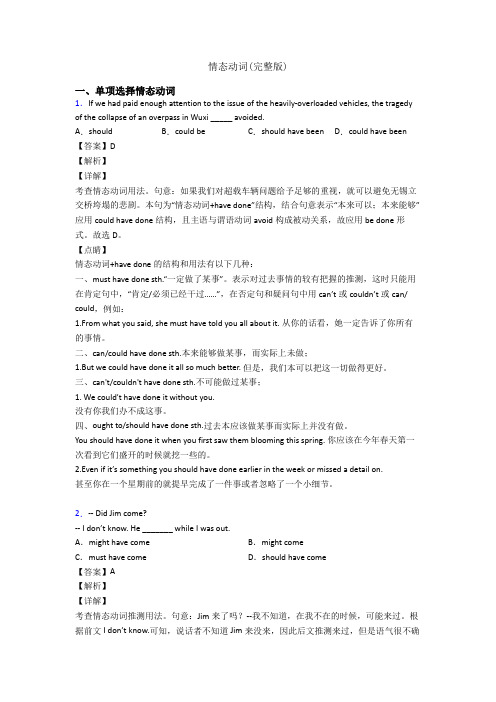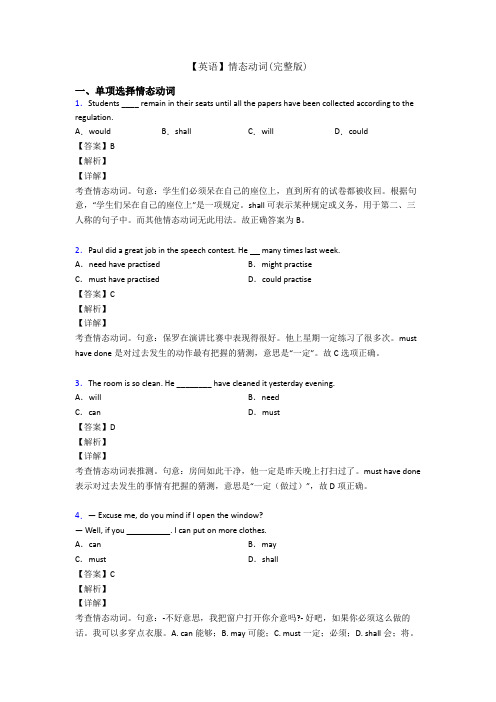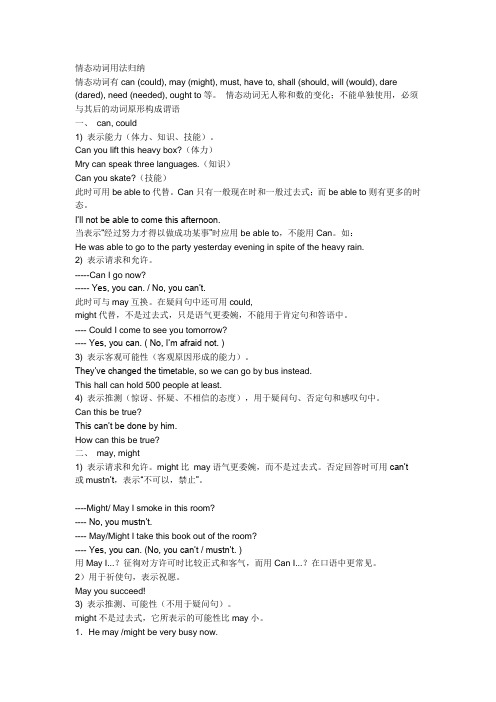情态动词(完整版)
- 格式:doc
- 大小:71.00 KB
- 文档页数:10

情态动词定义:情态动词是一种本身有一定的词义,但要与动词原形一起使用,给谓语动词增添情态色彩,表示说话人对有关行为或事物的态度和看法,认为其可能、应该或必要等。
情态动词后面加动词原形。
分类:情态动词有四类:①只做情态动词:must,can(could),may(might),ought to②可做情态动词又可做实义动词:need,dare③可做情态动词又可做助动词:shall(should),will(would)④具有情态动词特征:have(had) to,used to位置:情态动词在句中放在谓语动词之前, 谓语动词前若有助动词,则在助动词之前,疑问句中, 情态动词则在主语之前。
I can see you. Come here.我能看见你,过来吧。
He must have been away.他一定走了。
What can I do for you?我能帮你吗?How dare you treat us like that!你怎能那样对待我们!特点:情态动词无人称和数的变化, 情态动词后面跟的动词需用原形,否定式构成是在情态动词后面加"not"。
个别情态动词有现在式和过去式两种形式, 过去式用来表达更加客气, 委婉的语气, 时态性不强, 可用于过去,现在或将来。
情态动词属非及物动词,故没有被动语态。
情态动词没有非谓语形式,即没有不定式,分词,等形式。
He could be here soon.他很快就来。
We can't carry the heavy box.我们搬不动那箱子。
I'm sorry I can't help you.对不起,我帮不上你。
基本助动词与情态助动词最主要的区别之一是,基本助动词本身没有词义,而情态助动词则有自己的词义,能表示说话人对有关动作或状态的看法,或表示主观设想:What have you been doing since? (构成完成进行体,本身无词义)I am afraid I must be going. (一定要)You may have read some account of the matter. (或许已经)除此之外,情态助动词还有如下词法和句法特征:1)除ought和used以外,其他情态动词后面只能接不带to的不定式。

情态动词用法归纳情态动词有can (could), may (might), must, have to, shall (should, will (would), dare (dared), need (needed), ought to等. 情态动词无人称和数的变化;不能单独使用,必须与其后的动词原形构成谓语一、 can, could1) can, could表示能力(体力、知识、技能). Can you lift this heavy box?(体力)Mary can speak three languages。
(知识) Can you skate?(技能)此时可用be able to代替.用be able to改写上面三个句子。
Can只有一般现在时(can)和一般过去式(could);而be able to则有更多的时态。
am/is/are able to(一般现在时):I am able to do this job,其它几个自己改写was/were able to(一般过去式): He was able to do this jobwill be able to(一般将来时):I will(won't) be able to do this job this afternoonI'll not be able to come this afternoon.当表示“经过努力才得以做成功某事”时应用be able to,不能用Can.如:He can’t swim,but he is able to cross the river.2) can, could表示请求和允许。
—-———Can I go now? =May I go now?——-—- Yes, you can。
/ No,you can’t.=Yes,you may。
/No,you may not.此时可与may互换。

一情态动词的用法和辨析,情态动词表示推测和可能,由情态动词引导的一般疑问句的回答。
二 1 只是情态动词: can, could, may, might, must2 可做情态动词,可做实义动词: need, dare3 可做情态动词,可做助动词: will, would, shall, should4 特殊: have to, ought to, used to三 1 有一定的词义,但不能单独作谓语,必须与行为动词和系动词连用构成谓语。
2 无人称和数的变化。
( have to 除外)Eg: He has to stay here.3 后接动词原形。
4 具有助动词作用,可构成否定,疑问或简短回答。
四① 表示能力,“能,会”。
Eg : Can you play basketball?② 表示怀疑,猜测,常用于否定句或疑问句。
Eg :Li hua can’t be in the classroom.③ 表示请求,允许,多用于口语,译“可以”= may.Eg: youcangonow.④can 开头的疑问句,肯定句,否定句用 can 或 can’t.①can 的过去式,表示过去的能力。
Eg :I could swim when I was seven years old.②could 开头的疑问句,肯定和否定回答用 could, couldn’ t 如果 could 表示现在的委婉,用 can 回答。
Eg: Could I have a drink? Yes, you can.① 表示推测,“可能,也许”,用于肯定句。
Eg: He may come tomorrow.② 表示请求,“许可,可以”。
Eg: May I borrow your book?注:表示请求,许可时,主语为第一人称的一般疑问句,否定回答用 mustn’t“不可以,禁止,不许”,不用may not“可能不”。
③表示祝愿。
Eg :May you success.①表示“可以”,用于过去时中。

情态动词(完整版)一、单项选择情态动词1.If we had paid enough attention to the issue of the heavily-overloaded vehicles, the tragedy of the collapse of an overpass in Wuxi _____ avoided.A.should B.could be C.should have been D.could have been 【答案】D【解析】【详解】考查情态动词用法。
句意:如果我们对超载车辆问题给予足够的重视,就可以避免无锡立交桥垮塌的悲剧。
本句为“情态动词+have done”结构,结合句意表示“本来可以;本来能够”应用could have done结构,且主语与谓语动词avoid构成被动关系,故应用be done形式。
故选D。
【点睛】情态动词+have done的结构和用法有以下几种:一、must have done sth.“一定做了某事”。
表示对过去事情的较有把握的推测,这时只能用在肯定句中,“肯定/必须已经干过……”,在否定句和疑问句中用can’t或could n’t或can/ could,例如:1.From what you said, she must have told you all about it. 从你的话看,她一定告诉了你所有的事情。
二、can/could have done sth.本来能够做某事,而实际上未做;1.But we could have done it all so much better. 但是,我们本可以把这一切做得更好。
三、can't/couldn't have done sth.不可能做过某事;1. We could't have done it without you.没有你我们办不成这事。
四、ought to/should have done sth.过去本应该做某事而实际上并没有做。

【英语】情态动词(完整版)一、单项选择情态动词1.Students ____ remain in their seats until all the papers have been collected according to the regulation.A.would B.shall C.will D.could【答案】B【解析】【详解】考查情态动词。
句意:学生们必须呆在自己的座位上,直到所有的试卷都被收回。
根据句意,“学生们呆在自己的座位上”是一项规定。
shall 可表示某种规定或义务,用于第二、三人称的句子中。
而其他情态动词无此用法。
故正确答案为B。
2.Paul did a great job in the speech contest. He many times last week.A.need have practised B.might practiseC.must have practised D.could practise【答案】C【解析】【详解】考查情态动词。
句意:保罗在演讲比赛中表现得很好。
他上星期一定练习了很多次。
must have done是对过去发生的动作最有把握的猜测,意思是“一定”。
故C选项正确。
3.The room is so clean. He ________ have cleaned it yesterday evening.A.will B.needC.can D.must【答案】D【解析】【详解】考查情态动词表推测。
句意:房间如此干净,他一定是昨天晚上打扫过了。
must have done 表示对过去发生的事情有把握的猜测,意思是“一定(做过)”,故D项正确。
4.— Excuse me, do you mind if I open the window?— Well, if you __________. I can put on more clothes.A.can B.mayC.must D.shall【答案】C【解析】【详解】考查情态动词。

情态动词用法归纳情态动词有can (could), may (might), must, have to, shall (should, will (would), dare (dared), need (needed), ought to等。
情态动词无人称和数的变化;不能单独使用,必须与其后的动词原形构成谓语一、can, could1) 表示能力(体力、知识、技能)。
Can you lift this heavy box?(体力)Mry can speak three languages.(知识)Can you skate?(技能)此时可用be able to代替。
Can只有一般现在时和一般过去式;而be able to则有更多的时态。
I’ll not be able to come this afternoon.当表示“经过努力才得以做成功某事”时应用be able to,不能用Can。
如:He was able to go to the party yesterday evening in spite of the heavy rain.2) 表示请求和允许。
-----Can I go now?----- Yes, you can. / No, you can’t.此时可与may互换。
在疑问句中还可用could,might代替,不是过去式,只是语气更委婉,不能用于肯定句和答语中。
---- Could I come to see you tomorrow?---- Yes, you can. ( No, I’m afraid not. )3) 表示客观可能性(客观原因形成的能力)。
They’ve changed the time table, so we can go by bus instead.This hall can hold 500 people at least.4) 表示推测(惊讶、怀疑、不相信的态度),用于疑问句、否定句和感叹句中。
情态动词归纳表高考热点透视热点一:表猜测的情态动词的用法。
热点二:情态动词+have done情态动词+have done的用法有两种含义:1. 对过去情况的猜测。
由表猜测的情态动词+have done构成。
上表已经提到。
2. 表示与过去事实的主观设想。
有轻微的责备、后悔之意。
请参看下表:热点三:shall,will,must等1. Shall ①用于第一人称疑问句中表示说话人征求对方的意见或向对方请求。
例:—The room is so dirty. _______ we clean it?—Of course. ( 03 上海春招)A. WillB. ShallC. WouldD. Do②用于第二人称陈述句表示说话人或他人的意图、命令、允诺、警告、命令等。
例:“The interest _______ be divided into five parts, according to the agreement made by both sides,” declared the judge. (04 重庆,24)A. mayB. shouldC. mustD. shall2. Will ①表示意愿或意志。
例:I __________ argue with you.②当主语是物时,则表示“不起作用”。
例:The drawer _________ shut.3. Must 表“必须、一定要”。
例:— Who is the girl standing over there?— Well, if you _______ know, her name is Mabel. (02,天津)A. mayB. canC. mustD. shall。
would : 1. 表 will 的过去 ,用于过去未来时2.表 "意向 ",愿意做某事3.虚构语气could: 1. 表 can 的过去 ,表过去的能力2表恳求 (委宛语气 )3.表猜想 :可能是 ...4.虚构语气should: 1. 表 shall 的过去 ,用于过去未来时,搭配第一人称2.表委宛的语气 : 应当做 ...3.虚构语气might: 1. may 的过去 ,表猜想 :可能是2.表允许 (委宛语气 )may:1. 表猜想 : 可能是think of shall 和2. 表允许想起 , 想到 ; 没有 think fromwill 的用法的用法一.1、 shall 用在第一、三人称,will用于第二人称表示“征采建议”。
Shall I go now?Shall we invite her, too?Will you help me with the work?Shall the reporters wait outside or what?2、 shall 表示依照规定有义务去做。
Passengers shall not talk with the driver while the bus is moving.3、 shall 用于全部人称,表示说话人的承诺、威迫、警示、命令等。
You shall have an answer by tomorrow.If he’ s good, he shall have a new watch for Christma.If you children don’ t do as I tell you, you shan ’ t go to the party. 4、 would 能够表示过去的习惯(would 可表示频频发生的动作或某种偏向。
used to 表示过去的习惯动作或状态,重申此刻已不存在)He would come to see me on Sunday when he was here.The dog would lie there in the sun all afternoon.When we were children, we would go skating every winter.5、 will 能够表示“愿意” ,而非未来 :I will pay you for it.我会付给你钱买下它的。
(完整版)情态动词should的讲解情态动词should一:用来表示现在或者将来的责任、义务,译为应该、应当,在此情况下可与ought to,be supposed to 互换使用。
例如:You should complete your text in time。
二:用来表示意外、惊喜、不可思议的情况,译为竟然、竟会。
例如:He should lie to me.(他竟然骗我)三:表示猜测、推论,译为可能、应该、总该例如:They should be home by now。
(他们现在应该回家了)四:在虚拟语气中1:在条件句中,表示对将来的假设例如:If it should rain tomorrow,I wouldn’t go. (= Should it rain tomorrow, I wouldn’t go。
)如果明天下雨我就不去了2:在suggest、decide、advise、order、demand、request、insist等表示建议、决定、劝告、命令、要求等动词后面,形式为主语+(should)+动词原形例如:He insisted that we (should )take up the matter at the meeting 他坚持要我们在会上提出这个事项。
3:用在it is suggested/requested/ordered/proposed之后的由that引导的主语从句中例如: It is requested that you (should) give a performance at the party。
大家要求你要在聚会上表演.4:用在suggestion/order/advice/request等名词之后引导的从句中例如:My idea/ motion/ advice/ is that we (should) do more eye exercises every day。